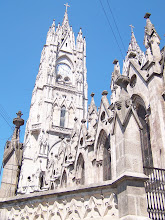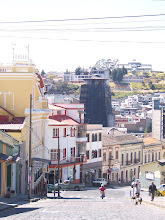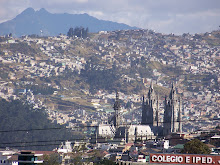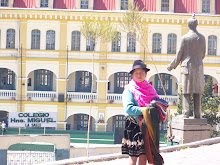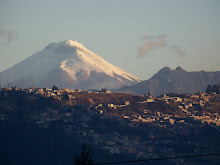Culture shock. It´s one of those slippery terms that can mean just about anything, from somebody serving you a steaming platter of ox tail to having your cab driver weave down the street backwards in an attempt to find your house (both of which have happened, needless to say). It can be other things too, like the acceptance of a perpetually volatile political climate. Televised news affirms this daily, with its incessant newscasts of the Indigenous marching the street, yelling and rolling tires and tossing burning branches, all in protest of the government´s policies on water. Culture shock is mostly just the daily things, though, like remembering to greet everybody with an ¨Hola¨ and a touching of cheeks. Getting beyond the greeting, of course, is an adventure in itself, and mix-ups are more or less constant for new speakers like me. The words ¨city¨ and ¨careful¨ sounded very similar to me, and when my host mother in Quito would admonish me to be careful, I would attempt to agree by saying, “I´m a city,” and step cheerfully out the door. I´m sure that was little comfort to my host mom.
“Cuidad,” or “careful,” is perhaps a word I need to take to heart. My first day in Riobamba on Monday, I popped on my running shoes, ready to take advantage of the safer environment that Riobamba affords (more so than Quito, anyway). But what Riobamba lacks in thieves and frenzied traffic, it more than makes up for in potholes. I was about six blocks away from my house when I stepped in one of these little hazards, twisting my ankle so badly I could hardly limp out of the street. Sitting down and trying desperately not to faint, I was obliged to eventually hop in a car of an Ecuadorian family, who seemed rather excited to be rescuing a lame foreigner in distress. I promptly called my host mom upon returning, trying to explain what happened over the phone, but I used the wrong word for pothole, saying instead, “Violetta, I have little problem. I ran and stepped in golf hole. Now ankle sick.” Probably wondering what on earth I was doing on a golf green, my host mom came home and whisked me off to the doctor, where I was fixed up with a brace and an ancient-looking crutch sized for Bilbo Baggins. Already conspicuous as a 5’10” white female, flailing down the street with my tiny cane I must look like a regular circus act.
I´m happy to say my ankle is doing better, though I need to stay off of it for a few more days. In the meantime, I´m settling down with my stacks of English grammar books and attempting to guess what my future students may or may not know. I will be teaching advanced-intermediate, which could really mean anything….like all things "culture shock," I´ll do my best to anticipate my students, and, when my expectations hit way off mark, I´ll just simply readjust and keep going.
Wednesday, September 30, 2009
Tuesday, September 22, 2009
Training Wheels
The Monday before last, I started practice teaching a two-week course in Quito. It's basically a chance for us volunteers to take our first wobbly steps as educators (before we start teaching in our assigned provinces). Despite my year in Americorps in front of, shall I say, energetic high school students, I still felt undeniably nervous about this little two-week experiment. How much English would my students know already? Would I have five students or forty? It was hard to say.
Really, though, there is no predicting a class in Ecuador. Though all self-classified as “beginner,” in every other way my students are as diverse as if you had just unloaded a city bus straight to my classroom door. The would-be English speakers include Joshua, a daunted-looking 15-year-old whose mother clearly signed him up for the course, to Patricio, a spry middle-aged man who enthusiastically pumps everyone’s hand upon arriving, to Ramiro, a lackadaisically confident 22-year old with long curly hair, who props his feet up on his desk and smirks while yelling out the answers before all the other students.
Because all we volunteers are technically practice teaching, the class is free for students. That means there is not only a range in ability but also in dedication. I’ve had students pop into class just long enough to learn their favorite color in English before apparently running for their lives, and other more dedicated students burst into class 45 minutes late, straight from work and breathless. Despite the mayhem, though, most students can at least now order food in a restaurant, go grocery shopping, recite a morning schedule, and identify their profession in English (or some version thereof). They have also learned how to play BINGO, a crucial skill should they ever retire to small-town Minnesota. I, in turn, have had the amusement of seeing grown men in business suits all simultaneously color a menu.
Even with all the preparation for lesson plans, there’s still been time for some adventures. Last weekend several of us volunteers climbed Mt. Pichincha. It’s said to be about 13,000 feet, so not nearly as high as many of the neighboring volcanoes, but still high enough to leave you winded and to make the sprawl of Quito look like Lego Land. The entire way up, we were treated to absolutely stunning views, the breadth and distance of which is impossible to capture on a camera. I’ve never seen planes fly below me before. Well, we got these views almost all the way up; near the top, a rush of clouds engulfed the mountain in a matter of minutes, reducing our vision to pure white. Exciting, in a way, but also a little scary as we scrabbled our way down the rock face, dodging drops of rain and hail. I’m happy to say that the only damage done was an achy muscle or two, and we were ready to start classes again on Monday.
Really, though, there is no predicting a class in Ecuador. Though all self-classified as “beginner,” in every other way my students are as diverse as if you had just unloaded a city bus straight to my classroom door. The would-be English speakers include Joshua, a daunted-looking 15-year-old whose mother clearly signed him up for the course, to Patricio, a spry middle-aged man who enthusiastically pumps everyone’s hand upon arriving, to Ramiro, a lackadaisically confident 22-year old with long curly hair, who props his feet up on his desk and smirks while yelling out the answers before all the other students.
Because all we volunteers are technically practice teaching, the class is free for students. That means there is not only a range in ability but also in dedication. I’ve had students pop into class just long enough to learn their favorite color in English before apparently running for their lives, and other more dedicated students burst into class 45 minutes late, straight from work and breathless. Despite the mayhem, though, most students can at least now order food in a restaurant, go grocery shopping, recite a morning schedule, and identify their profession in English (or some version thereof). They have also learned how to play BINGO, a crucial skill should they ever retire to small-town Minnesota. I, in turn, have had the amusement of seeing grown men in business suits all simultaneously color a menu.
Even with all the preparation for lesson plans, there’s still been time for some adventures. Last weekend several of us volunteers climbed Mt. Pichincha. It’s said to be about 13,000 feet, so not nearly as high as many of the neighboring volcanoes, but still high enough to leave you winded and to make the sprawl of Quito look like Lego Land. The entire way up, we were treated to absolutely stunning views, the breadth and distance of which is impossible to capture on a camera. I’ve never seen planes fly below me before. Well, we got these views almost all the way up; near the top, a rush of clouds engulfed the mountain in a matter of minutes, reducing our vision to pure white. Exciting, in a way, but also a little scary as we scrabbled our way down the rock face, dodging drops of rain and hail. I’m happy to say that the only damage done was an achy muscle or two, and we were ready to start classes again on Monday.
Sunday, September 13, 2009
Riobamba or bust!
I’ve been in Ecuador for two weeks now, and a few things have become routine. First and foremost, a two-course lunch is only supposed to cost $1.50; only spend $2.00 if you really want to splurge. Second, you can expect to see a few forest fires every day, smoking away in the dry mountains. Third, automobiles always have right-of-way – if you question it, the bus will certainly win.
This is not to say that life in Ecuador has become exactly predictable. Last Thursday, me and three other volunteers left Quito and hopped on a bus to our teaching placement four hours away in Riobamba. Little did I know that a bus ride is more like a mobile shopping mall. At the moment the bus slowed to let off a passenger or pay a toll, a vender of some sort would leap onto the bus, chanting advertisements and waving his offering, from dried banana chips to clearly rip-off perfume brands. You can imagine the consequences of a bus full of passengers all applying generous perfume samples at the same time. Whew!
Arriving in Riobamba a tad more fragrant than when we left, all of us volunteers were thrilled with what we found in the city. Our directors had told us that many volunteers were initially disappointed in their placements, and we had consequently spent the bus ride peering anxiously out at the crumbling concrete settlements we saw in the countryside. It turned out, though, that Riobamba was full of restaurants, discotheques, parks, and thankfully all sorts of ice cream shops, but was still small enough where a cab ride to any place in the city was only a dollar. Clearly, it was a place where we could spend a year.
During my second day in Riobamba, I paid a visit to the director at my teaching site, a sprawling university known as ESPOCH that’s located near the outskirts of town. I was delighted to see that I had a large, sunlit classroom, complete with a whiteboard and projector screen. Planning a curriculum may be a bit of an adventure, however. The assistant director scrawled a few notes for me in Spanish about what I might teach (I’ll certainly need a Spanish dictionary, a magnifying glass, and perhaps a Private Eye to help me decipher exactly what it means), but it seems that my students will be at my mercy in terms of lesson plans. With only four days of teaching per week, however, I’ll hopefully have time to be creative!
This is not to say that life in Ecuador has become exactly predictable. Last Thursday, me and three other volunteers left Quito and hopped on a bus to our teaching placement four hours away in Riobamba. Little did I know that a bus ride is more like a mobile shopping mall. At the moment the bus slowed to let off a passenger or pay a toll, a vender of some sort would leap onto the bus, chanting advertisements and waving his offering, from dried banana chips to clearly rip-off perfume brands. You can imagine the consequences of a bus full of passengers all applying generous perfume samples at the same time. Whew!
Arriving in Riobamba a tad more fragrant than when we left, all of us volunteers were thrilled with what we found in the city. Our directors had told us that many volunteers were initially disappointed in their placements, and we had consequently spent the bus ride peering anxiously out at the crumbling concrete settlements we saw in the countryside. It turned out, though, that Riobamba was full of restaurants, discotheques, parks, and thankfully all sorts of ice cream shops, but was still small enough where a cab ride to any place in the city was only a dollar. Clearly, it was a place where we could spend a year.
During my second day in Riobamba, I paid a visit to the director at my teaching site, a sprawling university known as ESPOCH that’s located near the outskirts of town. I was delighted to see that I had a large, sunlit classroom, complete with a whiteboard and projector screen. Planning a curriculum may be a bit of an adventure, however. The assistant director scrawled a few notes for me in Spanish about what I might teach (I’ll certainly need a Spanish dictionary, a magnifying glass, and perhaps a Private Eye to help me decipher exactly what it means), but it seems that my students will be at my mercy in terms of lesson plans. With only four days of teaching per week, however, I’ll hopefully have time to be creative!
Sunday, September 6, 2009
Ecua-mersion
Well, here it is - my very first blog! I've been in Ecuador for about a week now, though it seems about three times as long as that. It's a strange feeling to have swapped my life for another one in the matter of a plane ride or two - a new city, a new language, and new friends have suddenly become mine in just a few hours.
I suppose I should begin with a description of Quito, Ecuador's capital city where I am living to train as an English teacher. At 9,000 feet, it is one of the highest cities in the world, and all of we gringos (foreigners) started panting in the thin atmosphere almost as soon as we got off the plane! It's a long, skinny city, about 35 miles long and only about 5 miles wide, and is wedged into a valley in the towering Andes, which, I found out, are mostly moody volcanoes that treat Ecuador to the occasional ash eruption. Quito is a busy, chaotic city; full of rickety stick-shift cars and buses that belch smog, restaurants and dance venues painted exuberant yellows, pinks and reds (though many have faded with wear and dust), and, of course, the blare of cumbia and reggae ton music mixed with incessant honking cab horns. The old part of the city is a little quieter, with pedestrian-only cobbled streets and town squares filled with flowering trees and park benches, not to mention beautiful churches and an impressive basilica, though it is typically filled with people.
Just outside of Quito, the scenery is almost impossibly beautiful; we volunteers took a bus ride to some hot springs last weekend, and every (often hair-raising) turn around a mountain bend revealed yet another view of the looming, forested Andes and the little streams and waterfalls that wound throughout. The dramatic scenery (not to mention the rather sharp drop-offs) kept me wide-eyed the entire time.
Part of the immersion experience in Quito is staying with a host family during my three weeks of orientation. They are a lovely family and quite well-off by Ecuadorian standards. They speak virtually no English, which means there is a lot of pointing and confused glances. Most of my conversation still consists of the most basic comments. “Beautiful mountain,” I will observe carefully, pointing at the mountain Cotopaxi. “Yes, yes,” my patient listener will agree gravely about the mountain he or she has seen a thousand times. “Beautiful.” Sometimes my host mom will just throw up her hands and laugh when my Spanish tongue malfunctions, particularly when I say a dirty Spanish word when I mean to say “spoon,” or when I invited my host sister to a pineapple instead of a picnic. But I’m learning new Spanish words every day, and it’s exciting when I can say, “I’m going to the bus stop” rather than just “Bus! Me bus now!”
Even my host family’s house is an immersion experience. While my house in the States is a prime example of sparsely tasteful Western decoration, my house in Quito is an Ecuadorian pawn shop explosion. Every available surface is loaded with knick knacks, from fake flowers to Virgin figurines to snowglobes of Washington D.C. to trumpeting elephant figurines; enormous fake sunflowers grace the corners, and all of the furniture gleams in gold upholstery.
Different tastes in décor accounted for, however, my host family takes splendid care of me. I get fed marvelously seasoned soups every day, as well as a manner of things that I can’t identify but are delicious none the less. I have a host sister who is 21 and wants to be my best friend; she’s shown me a lot of her Latin music, and I’ve shown her how to play Frisbee (on the roof terrace, no less!) My host parents took great care in making sure I could make it to the bus on the first day of orientation classes. Originally, my mom told me to “get off the bus at the chicken,” and it took a trip in the family car to demonstrate that my bus stop was at the KFC.
“Bus stop” is really a misnomer, however. In Ecuador there are a few bus stops, but typically you just hail a bus like you would a cab…and most of the time, at least, the bus driver is kind enough to bring the bus to a full stop, but it isn’t something you can count on. They don’t waste much time in moving along, however, and more than once I’ve almost toppled into some unsuspecting person’s lap while trying to find a seat.
Orientation is also going well. There is a fantastic group of 36 volunteers, very adventurous and positive, and there is great rapport developing among us. During orientation, we’ve been learning all sorts of teaching techniques about how to introduce English to our university students – there is absolutely no Spanish allowed in the classroom, apparently (luckily for me!). We’ve also been learning the various hazards of living as gringos in Ecuador. As foreigners appear to be both wealthy and vulnerable at the same time, and thus are walking bulls-eyes for petty theft. One of the more peculiar stunts that pickpockets will pull is called “mustardization.” It’s a two person operation: the first thief will sneak up behind a gringo with a bottle of mustard and squirt it on said gringo, apparently without the foreigner noticing. The thief will then ditch the mustard bottle and say to the accosted foreigner, “Oh, look! You have mustard on you! Here, I have some napkins…let me help you!” In the midst of the commotion, the second thief will then make off with the gringo’s purse or backpack. So now the gringo not only is out of his or her wallet, but also has a heinous mustard stain. Talk about adding insult to injury.
That’s all for now – thanks for sticking with this rather extensive blog post. I hope that you’re all well, and would love to hear from you at some point! I will be posting again hopefully next Sunday.
I suppose I should begin with a description of Quito, Ecuador's capital city where I am living to train as an English teacher. At 9,000 feet, it is one of the highest cities in the world, and all of we gringos (foreigners) started panting in the thin atmosphere almost as soon as we got off the plane! It's a long, skinny city, about 35 miles long and only about 5 miles wide, and is wedged into a valley in the towering Andes, which, I found out, are mostly moody volcanoes that treat Ecuador to the occasional ash eruption. Quito is a busy, chaotic city; full of rickety stick-shift cars and buses that belch smog, restaurants and dance venues painted exuberant yellows, pinks and reds (though many have faded with wear and dust), and, of course, the blare of cumbia and reggae ton music mixed with incessant honking cab horns. The old part of the city is a little quieter, with pedestrian-only cobbled streets and town squares filled with flowering trees and park benches, not to mention beautiful churches and an impressive basilica, though it is typically filled with people.
Just outside of Quito, the scenery is almost impossibly beautiful; we volunteers took a bus ride to some hot springs last weekend, and every (often hair-raising) turn around a mountain bend revealed yet another view of the looming, forested Andes and the little streams and waterfalls that wound throughout. The dramatic scenery (not to mention the rather sharp drop-offs) kept me wide-eyed the entire time.
Part of the immersion experience in Quito is staying with a host family during my three weeks of orientation. They are a lovely family and quite well-off by Ecuadorian standards. They speak virtually no English, which means there is a lot of pointing and confused glances. Most of my conversation still consists of the most basic comments. “Beautiful mountain,” I will observe carefully, pointing at the mountain Cotopaxi. “Yes, yes,” my patient listener will agree gravely about the mountain he or she has seen a thousand times. “Beautiful.” Sometimes my host mom will just throw up her hands and laugh when my Spanish tongue malfunctions, particularly when I say a dirty Spanish word when I mean to say “spoon,” or when I invited my host sister to a pineapple instead of a picnic. But I’m learning new Spanish words every day, and it’s exciting when I can say, “I’m going to the bus stop” rather than just “Bus! Me bus now!”
Even my host family’s house is an immersion experience. While my house in the States is a prime example of sparsely tasteful Western decoration, my house in Quito is an Ecuadorian pawn shop explosion. Every available surface is loaded with knick knacks, from fake flowers to Virgin figurines to snowglobes of Washington D.C. to trumpeting elephant figurines; enormous fake sunflowers grace the corners, and all of the furniture gleams in gold upholstery.
Different tastes in décor accounted for, however, my host family takes splendid care of me. I get fed marvelously seasoned soups every day, as well as a manner of things that I can’t identify but are delicious none the less. I have a host sister who is 21 and wants to be my best friend; she’s shown me a lot of her Latin music, and I’ve shown her how to play Frisbee (on the roof terrace, no less!) My host parents took great care in making sure I could make it to the bus on the first day of orientation classes. Originally, my mom told me to “get off the bus at the chicken,” and it took a trip in the family car to demonstrate that my bus stop was at the KFC.
“Bus stop” is really a misnomer, however. In Ecuador there are a few bus stops, but typically you just hail a bus like you would a cab…and most of the time, at least, the bus driver is kind enough to bring the bus to a full stop, but it isn’t something you can count on. They don’t waste much time in moving along, however, and more than once I’ve almost toppled into some unsuspecting person’s lap while trying to find a seat.
Orientation is also going well. There is a fantastic group of 36 volunteers, very adventurous and positive, and there is great rapport developing among us. During orientation, we’ve been learning all sorts of teaching techniques about how to introduce English to our university students – there is absolutely no Spanish allowed in the classroom, apparently (luckily for me!). We’ve also been learning the various hazards of living as gringos in Ecuador. As foreigners appear to be both wealthy and vulnerable at the same time, and thus are walking bulls-eyes for petty theft. One of the more peculiar stunts that pickpockets will pull is called “mustardization.” It’s a two person operation: the first thief will sneak up behind a gringo with a bottle of mustard and squirt it on said gringo, apparently without the foreigner noticing. The thief will then ditch the mustard bottle and say to the accosted foreigner, “Oh, look! You have mustard on you! Here, I have some napkins…let me help you!” In the midst of the commotion, the second thief will then make off with the gringo’s purse or backpack. So now the gringo not only is out of his or her wallet, but also has a heinous mustard stain. Talk about adding insult to injury.
That’s all for now – thanks for sticking with this rather extensive blog post. I hope that you’re all well, and would love to hear from you at some point! I will be posting again hopefully next Sunday.
Subscribe to:
Comments (Atom)







